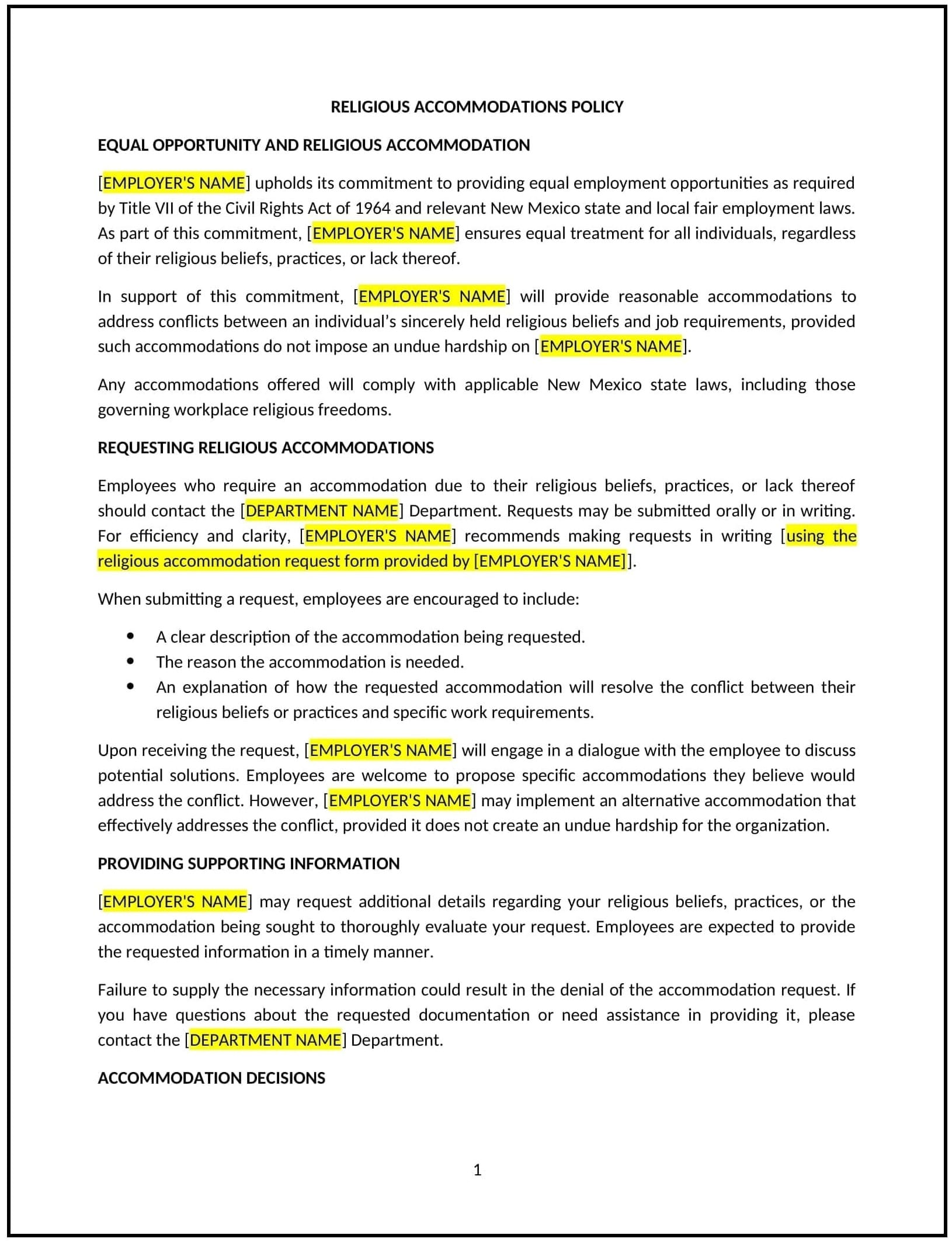Religious accommodations policy (New Mexico): Free template
Got contracts to review? While you're here for policies, let Cobrief make contract review effortless—start your free review now.

Customize this template for free
Religious accommodations policy (New Mexico)
This religious accommodations policy is designed to guide New Mexico businesses in addressing employees' religious practices and beliefs while maintaining a productive and inclusive workplace. The policy outlines the company's responsibilities to provide reasonable accommodations for employees' religious observances and practices, such as prayer, fasting, or religious holidays, as long as doing so does not cause undue hardship to the company.
By adopting this policy, New Mexico businesses can promote inclusivity, reduce the risk of discrimination claims, and support employees' religious freedoms in the workplace.
How to use this religious accommodations policy (New Mexico)
- Define religious accommodations: Clearly define what constitutes a religious accommodation, including time off for religious observances, flexibility in work schedules for prayer, or exceptions to dress code policies.
- Establish the request process: Specify how employees should request religious accommodations, including the notice period and any supporting documentation they may need to provide. The process should be straightforward and confidential.
- Evaluate requests: Outline how the business will evaluate accommodation requests. Consider factors such as operational needs, employee role, and potential impact on co-workers.
- Provide alternative solutions: If an employee’s request for religious accommodation cannot be fully met, businesses should work to find a reasonable alternative that respects the employee’s needs while ensuring minimal disruption to business operations.
- Address New Mexico-specific considerations: Ensure the policy accounts for any state-specific legal requirements or guidance related to religious accommodation in New Mexico.
Benefits of using this religious accommodations policy (New Mexico)
Implementing this policy provides New Mexico businesses with several advantages:
- Fosters an inclusive work environment: By accommodating employees’ religious practices, businesses create a more inclusive workplace that respects diversity and supports employees' needs.
- Reduces legal risks: A clear policy helps businesses avoid potential religious discrimination claims, demonstrating a proactive approach to handling accommodation requests in line with New Mexico’s and federal laws.
- Enhances employee satisfaction: Offering reasonable accommodations for religious observances helps employees feel valued and respected, contributing to higher morale and employee retention.
- Promotes fairness and consistency: The policy ensures that religious accommodation requests are handled fairly and consistently, helping to prevent any bias or discrimination in the workplace.
- Increases company reputation: A company that is seen as supporting religious diversity can improve its reputation, both internally and externally, making it an attractive employer to a diverse range of employees.
Tips for using this religious accommodations policy (New Mexico)
- Communicate the policy clearly: Ensure that employees are aware of the policy and understand how they can request accommodations. The policy should be included in the employee handbook and reviewed during onboarding.
- Train managers: Train supervisors and HR personnel to handle accommodation requests sensitively and fairly. They should understand both the company policy and legal requirements related to religious accommodations.
- Review requests promptly: Address religious accommodation requests as soon as possible, ensuring that the process is efficient and employees are informed of decisions in a timely manner.
- Keep records confidential: Maintain confidentiality of all religious accommodation requests to protect employee privacy. This helps create a trust-based environment where employees feel comfortable making accommodation requests.
- Review the policy regularly: Review the policy annually to ensure it remains in line with New Mexico’s laws and any changes to federal regulations or company practices.